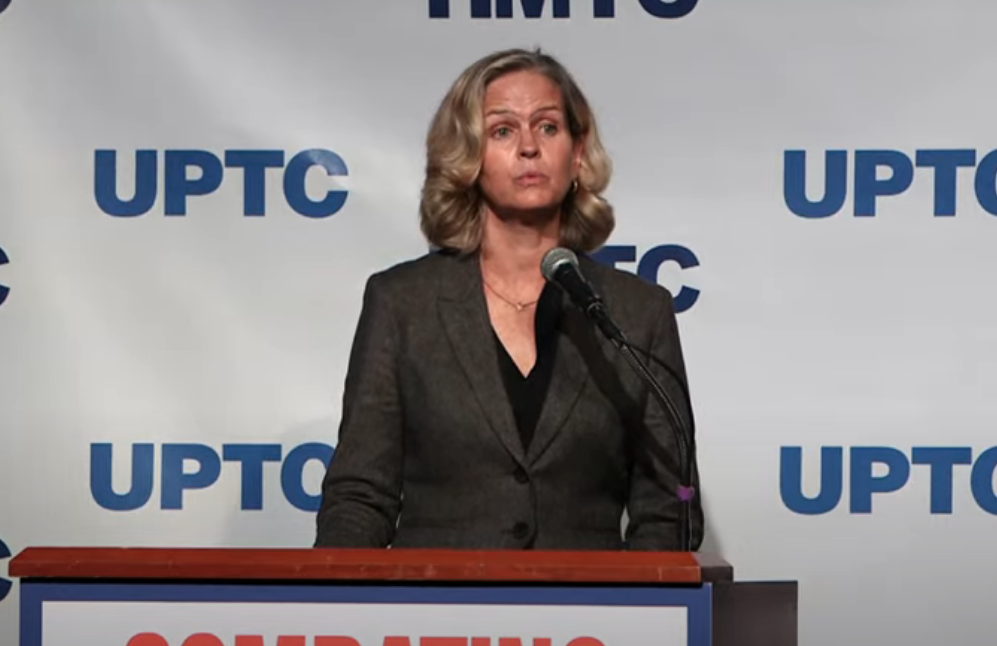A panel of educators discussed the history of and ways to combat antisemitism during an event at the Great Neck North High School auditorium Tuesday evening.
The panel was composed of Great Neck School Superintendent Teresa Prendergast, Nassau County Executive Laura Curran, Holocaust Memorial & Tolerance Center acting Executive Director Andrea Bolender, Stony Brook University Professor Sara Lipton, district Assistant Superintendent for Secondary Education Stephen Lando and district Assistant Superintendent for Elementary Instruction Kelly Newman.
Lipton kicked off the discussion by providing the audience with some background on antisemitism’s roots that can be stretched back thousands of years ago. Around the years 1150-1200, Lipton said, is when the more common antisemitic stereotypes and language still prevalent today began.
With manuscripts and works of art depicting them as “Christ killers,” a long line of discrimination toward Jewish people began. Punitive taxes and expulsions from certain areas in Europe became more frequent during the mid-1200s, Lipton said, leading up to a large population of Jewish people being forced out of Spain in 1492.
“As in the early days of Christianity, my explanation is that there was an increased need and desires among Christians to distinguish themselves from Jews,” Lipton said. “There was a desire to set themselves apart socially, culturally and economically from Jews.”
Matthew Wigler, a teacher and North High graduate, graduated from Stanford University in 2019. Wigler, who is Jewish, referred to a statistic provided by the American Jewish Committee, that 82 percent of American Jews have felt antisemitism increase in the last five years. Additionally, Wigler said, 1 in 4 American Jews said that they had personally been the target of antisemitism over the past year.
“Frankly, any Jewish student can tell you today that, whether on campus or social media, we are facing a surge in antisemitism that we must all stand vigilant against together,” Wigler said.
Curran, a Democrat seeking re-election this year, spoke on efforts the county has made to combat instances of antisemitism in Nassau. She referred to a pre-COVID march against antisemitism that garnered thousands in support.
“That made me very optimistic about this county, about us as a people here,” Curran said. “It’s so important to say, with one voice, that Nassau County stands with our Jewish brothers and sisters.”
Prendergast said she and the entire school district feel confident they can learn from past instances of hatred and antisemitism and continue to educate students and teachers.
“We can learn from the past in order to create a better future for us all,” she said. “Our children deserve nothing less.”
Newman said the district uses social and emotional learning, partnerships with the Holocaust Memorial & Tolerance Center, teaching identity and acceptance, and ensuring every student feels heard and acknowledged to educate elementary school students.
“We believe we must know our students individually, culturally, and developmentally,” Newman said. “To know that you are known gives you the motivation to learn. When children feel known, understood, and accepted, that more than anything else gives them a reason to want to come to school every day.”
Lando touted the district’s secondary school curriculum to educate students on the Holocaust and antisemitism, saying it “far exceeds state expectations.” Through educational film series, books, assemblies, general discrimination studies and constant review of educators’ lesson plans, he said, students at the secondary school are able to learn ways to combat antisemitism inside and out of the classroom.
“Our constant exploration of resources and the current events of our times will foster the evolution of learning and teaching that will undoubtedly ensure that every Great Neck student will never forget,” Lando said.
Bolender, who is the daughter of an Auschwitz survivor, said the Holocaust Memorial & Tolerance Center partners with school districts throughout Nasssau County to educate and inform students of all ages about the results of hatred, bullying and intolerance. She said the center will roll out the Irving Roth Memorial Teacher Institute, name for a longtime supporter of the center and Holocaust survivor who died in February.
Bolender said the institute will educate 91 teachers on the history of antisemitism and the Holocaust, one for each of the 91 years Roth lived.
Great Neck community leaders Lori Beth Schwartz and Judy Liman spearheaded the event in conjunction with the Great Neck school district, the Holocaust Memorial & Tolerance Center of Nassau County and the United Parent Teacher Council’s Total Community Involvement Committee. Schwartz said the event was created to not just educate the community on the history of antisemitism, but to educate the educators who pass knowledge on to younger generations.



